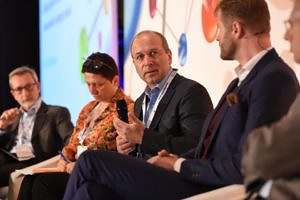
Improving medicines for children and collaborating for cancer medicine development are topics on which I am working, across functions and organisations in the academic, private and governmental sector. I have been humbled by invitations to address my topics in public, and here is a collection of these contributions. A list of journal articles is at ORCID.
Explaining how advancing regulatory science through research will accelerate medicine development and evaluation at our workshop to update research needs and introduce an European platform, involving many researchers from academia, regulators and industry (2024-11-18) https://youtu.be/qO1oW5ehc0E&t=18s
Accelerating progress in oncology with broad change management as a possible model for a system approach (2024-10-10): my proposal and presentation at the capacity building event of the Comprehensive Cancer Infrastructures for Europe (CCI4EU) project https://www.eso.net/en/what-we-do/past-events/events-2024/bringing-research-insights-into-clinical-implementation/3-6379-0-.
Presenting and discussing how developing new medicines for patients with a rare tumour by academic researchers and developers can be supported by, and discussed with medicine regulators (2024-01-12): https://youtu.be/up-e4MJk6Pk?t=1469 and https://www.ema.europa.eu/en/events/ema-eortc-multi-stakeholder-workshop-soft-tissue-bone-sarcoma See also the 2012 monograph linked below.
Running our Academia info day, providing a broad overview on ways of collaboration of regulators and academia (2023-11-10): https://youtu.be/vzSLBayIc5E.
Discussing and advancing treatments for children with a cancer — 10 years ACCELERATE (2022-02) https://vimeo.com/689363401/5a480c0266. In this interview, others and I who support the initiative reflect on the beginnings and future of this impactful multi-stakeholder platform.
Real-World-Evidence – rascherer Fortschritt für Krebsarzneimittel? (2020-05) In this German Cancer Society magazine, health care voices set out more concretely how to work on and use clinical data from sources other than clinical trials.
Clinical cancer research across Europe: Do we need to change tracks? (2019-09) ECCO 2019 European Cancer Summit https://vimeo.com/384534396. Part of this talk was to explain opportunities to collaborate for collecting data on how patients are doing after a cancer medicine is authorised.
"The clear progress for adult patients with cancer is not reaching children. A drug’s mechanism of action has been considered in all our discussions with companies since 2008." (2016-09) Interview in Cancerworld: New drugs for childhood cancers: could biotechs end the drought? https://cancerworld.net/spotlight-on/new-drugs-for-childhood-cancers-could-biotechs-end-the-drought/. The voices also articulate the challenges and the urgent needs. While there are more and more new cancer medicines authorised for children, there is a gradual change in how early trials are starting with children.
Regulator's perspective (2019-12) CDDF Multi-stakeholder Workshop on the Use of Real-World Data to Optimize Oncology Drug Development and Access https://cddf.org/wp-content/uploads/2019/12/Day1_1330_Ralf-Herold.pdf
International collaboration of academic study groups, pharmaceutical companies and regulators (2012) https://web.archive.org/web/20230528121925/https://www.tmf-ev.de/DesktopModules/Bring2mind/DMX/Download.aspx?EntryId=15787&PortalId=0. This talk includes early reflections on registries to subscribe to transparency and reproducibility, and to provide complementary data for regulating medicines.
We started the collaborative initiative in paediatric oncology to accelerate developing anti-cancer medicines for children with a cancer, with the first Paediatric strategy forum for anaplastic lymphoma kinase (ALK) inhibition in paediatric malignancies https://www.ema.europa.eu/en/events/multi-stakeholder-paediatric-oncology-strategy-workshop-cancers-anaplastic-lymphoma-kinase-aberrations (2017-01-30) which led to impacts as reported in https://pubmed.ncbi.nlm.nih.gov/37975877/.
Results of juvenile animal studies (JAS) and impact on anti-cancer medicine development and use in children (2017) https://www.ema.europa.eu/en/documents/scientific-guideline/results-juvenile-animal-studies-jas-impact-anti-cancer-medicine-development-use-children_en.pdf. This report on our collaborative project of more than twenty cancer medicines is about findings and how clinical trials with children were informed.
Paediatric high-grade glioma medicines expert workshop (2011) https://www.ema.europa.eu/en/documents/report/meeting-report-paediatric-high-grade-glioma-medicines-expert-workshop_en.pdf. The meeting was held at a time when unprecedented progress was made in biological discoveries and understanding of tumours of the central nervous system (CNS). The recommendations were to exploit this progress as soon as possible for clinical research with children with a CNS tumour.
Showing efficacy in treating rare pediatric tumors (2012) Rare Tumors in Children and Adolescents https://link.springer.com/chapter/10.1007%2F978-3-642-04197-6_2. In the book chapter, we explain thinking and operating of regulators, and more importantly opportunities for non-conventional clinical research. Bayesian methodology is mentioned.
Class waiver revision (2015-05) EMA Industry stakeholder platform on Paediatric medicines https://www.ema.europa.eu/en/documents/presentation/presentation-class-waiver-list-review-background-approach-outcome-consequences-regulatory_en.pdf. To incorporate the evolution of science and regulatory experience was the motivation for a revision that led to much reduce automatic waivers of development for children for medicines proposed for adults. These aspects are explained in this presentation on a turning point in the regulatory handling of new medicines.
Adverse drug reactions in paediatric oncology (2014-04) EMA Workshop pharmacovigilance in the paediatric population https://www.ema.europa.eu/en/documents/presentation/presentation-adverse-drug-reactions-paediatric-oncology-ralf-herold_en.pdf. The safety of medicines is a concern for children of all ages. Here, I exemplify experience in paediatric oncology and how toxicity and safety data are collected in paediatric study groups, who can be contributors and collaborators for pharmaceutical companies and regulators.
Ethical considerations for paediatric trials (2011) Report on an international meeting at the EMA that I had the opportunity to co-organise https://www.ema.europa.eu/en/documents/report/ethical-considerations-paediatric-trials_en.pdf
Overview of paediatric investigation plans (PIPs) reviewed and paediatric trials suggested per therapeutic area (2009-02). Presented at the first meeting of the European Network of Paediatric Research at the European Medicines Agency (Enpr-EMA), which has become an important platform for multi-stakeholder collaboration. https://www.ema.europa.eu/en/documents/presentation/overview-pips-paediatric-trials-proposed-therapeutic-area-dr-ralf-herold_en.pdf
My doctoral thesis was a wet-lab research project to establish in the local lab a recently proposed method for analysing medicines that might be used to replace lung surfactant in seriously ill newborns and other patients (1997): Assessment of pulmonary surfactant function using a captive bubble surfactometer https://paediatricdata.eu/wp-content/uploads/2024/11/1997_hu-berlin__promotion.pdf